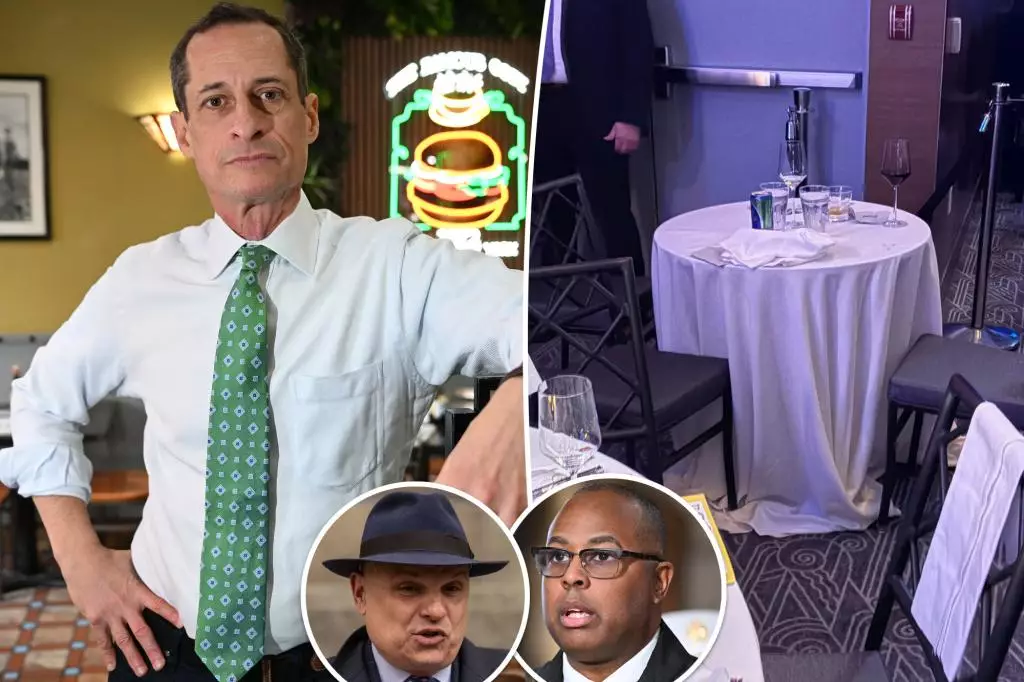In the high-stakes realm of New York’s political landscape, social gatherings often reveal much about status and reputation. The recent Inner Circle dinner, celebrated for its comedic takes on the city’s most notable figures, provided a revealing glimpse into the complex dynamics of power and embarrassment among attendees. The awkward moment that overshadowed the night involved none other than disgraced politician Anthony Weiner, whose relegation to what some dubbed the “kids’ table” became fodder for both laughter and criticism.
The image conjured by Weiner’s seating arrangement is inevitably amusing; a fallen political figure relegated to a mini-table at a gala defined by its elaborate social hierarchies. It highlights not just the physical positioning of individuals at a dining table, but the broader metaphorical implications of political stature—or lack thereof. Weiner’s placement at this social outpost exemplifies what many believe is a cultural tendency to ostracize those who have erred, regardless of their previous stature. Guests reportedly found his situation amusing, illuminating a certain schadenfreude that permeates these elitist gatherings.
The Aftermath of a Scandal
Weiner has endured scrutiny and scorn since his highly publicized scandals, and this gala was no exception. The laughably sparse “small Weiner table,” as insiders dubbed it, encapsulated the essence of his political downfall. An unnamed source hinted at a level of mockery amongst attendees, suggesting the incident symbolically reinforced Weiner’s diminished status. However, the former congressman himself vehemently denied suggestions that he left the event due to humiliation. Instead, he claimed it was an innocent mistake, with a need for him to leave early to care for his son.
This response reveals how Weiner is navigating the precarious path of public perception in the wake of profound personal and professional missteps. By distancing himself from embarrassment, he attempts to reclaim narrative control after years of negative press. Yet, the question remains: Can he truly return to the political spotlight when his mere presence in a room still incites laughter rather than respect?
Connections and Casualties
Compounding the drama of Weiner’s spirited exit was the presence of his former attorney, Arthur Aidala. Aidala, a seasoned figure in legal and political circles, has maintained a long-standing friendship with the fallen politician, which adds another layer of complexity to this narrative. Aidala, while supporting Weiner’s aspirations for a political revival, spoke candidly about the gala seating issue. He attributed the misjudgment to a simple error in organization, yet the humor surrounding it speaks volumes about the precarious nature of reputations in political circles.
What resonates here is the delicate dance of loyalty and embarrassment that often defines political relationships. Aidala’s support for Weiner, alongside his admission of the seating mishap being “unacceptable,” underscores the unexpected camaraderie that can form in the political arena—even amidst scandalous shadows. Are such connections genuinely benevolent, or are they simply strategic plays on a complex board of power?
Reflections on Redemption
As Weiner eyes a potential political comeback, the interplay between humor and reputation invites a broader discussion on redemption. The semi-comedic mishap he experienced at the gala highlights how societal perceptions can evolve—or stagnate—in response to past indiscretions. Can one really emerge unscathed and seek reentry into the political fray after personal disgrace, or are they forever bound to the comedic identities molded by their failures?
The annual Inner Circle charity event showcases the interplay of various political personas in a comedic light, suggesting that perhaps laughter—often derived from misfortune—can be a tool for reinvention. Yet, to thrive in such challenging environments, individuals must master the art of blending candid humor about their past with a compelling vision for the future. The gala serves as a testing ground for whether Weiner can convert last night’s jokes into the stepping stones necessary for a long-awaited revival.
The Stakes at the Inner Circle Gala
The Inner Circle gala serves not only as an essential gathering of influential figures but also as a barometer for political health within New York City. With politicians, media personalities, and public figures gathered to endure playful jabs from comedians, all share an unspoken understanding that in the world of politics, size—and seating arrangements—can matter considerably. As the public continues to scrutinize Weiner, his challenging journey towards redemption will unfold amid similar events.
While Weiner’s future remains uncertain, his presence at such gatherings—no matter how diminutive his seated stature—proves that in politics, survival is often about navigating the laughter and ridicule, understanding that public perception can be both a rope and a noose. Trajectories shift rapidly, yet the inner circle’s laughter carries the weight of collective judgment, and we cannot ignore the inherent complexities of return in a world that seeks to define us by our lowest moments.

